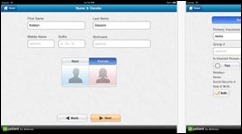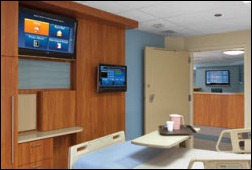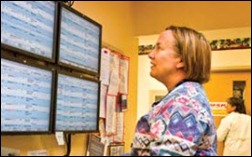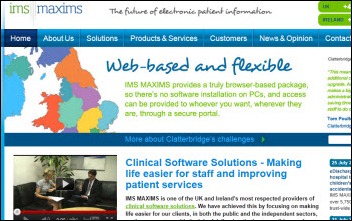Re: Dr Z. Great story, but whatever happened to professional courtesy???
News 8/19/11
Top News
![]() General Dynamics will acquire federal healthcare software vendor Vangent for $960 million, the company announced this week. Says the General Dynamics chairman and CEO, “Vangent is a well-regarded, fast-growing company that will add significant depth and breadth to General Dynamics’ healthcare IT organization, creating a Tier 1-level healthcare IT business unit with the scope and scale to compete in markets that are receiving high priority in current funding and entitlement-reform initiatives” The Arlington, VA-based Vangent, which has 7,500 employees, does work for HHS and the military. It developed the Army’s MC4 battlefield EMR. Kerry Weems, SVP and GM of Vangent’s Health Solutions business, joined the company in 2009 when he left his government position as head of CMS. He was also vice chairman of the American Health Information Community.
General Dynamics will acquire federal healthcare software vendor Vangent for $960 million, the company announced this week. Says the General Dynamics chairman and CEO, “Vangent is a well-regarded, fast-growing company that will add significant depth and breadth to General Dynamics’ healthcare IT organization, creating a Tier 1-level healthcare IT business unit with the scope and scale to compete in markets that are receiving high priority in current funding and entitlement-reform initiatives” The Arlington, VA-based Vangent, which has 7,500 employees, does work for HHS and the military. It developed the Army’s MC4 battlefield EMR. Kerry Weems, SVP and GM of Vangent’s Health Solutions business, joined the company in 2009 when he left his government position as head of CMS. He was also vice chairman of the American Health Information Community.
![]() From Watchdog: “Re: HIMSS. Pictures of its new headquarters in the financial district of Chicago. They also hired Steve Rosenfield as executive vice president / managing director of HIMSS Media, a new position and department, and seek an associate manager of social media to improve the society’s ‘positive visibility.’ All that was required is an Associate’s Degree.” Steve doesn’t appear to have a degree, but did write co-write this book documenting the late 70s history of an influential Long Island club that includes photos and an audio CD of the folks who performed there (Springsteen, Aerosmith, Rick Derringer, Stanley Clarke, etc.)
From Watchdog: “Re: HIMSS. Pictures of its new headquarters in the financial district of Chicago. They also hired Steve Rosenfield as executive vice president / managing director of HIMSS Media, a new position and department, and seek an associate manager of social media to improve the society’s ‘positive visibility.’ All that was required is an Associate’s Degree.” Steve doesn’t appear to have a degree, but did write co-write this book documenting the late 70s history of an influential Long Island club that includes photos and an audio CD of the folks who performed there (Springsteen, Aerosmith, Rick Derringer, Stanley Clarke, etc.)
![]() From One Of Their Hospitals: “Re: MDG Medical. The support numbers are no longer in service.” I ran this reader’s rumor last week, in which he said his hospital’s pharmacy got word from the pharmacy dispensing automation vendor that they would close their doors last Friday. I said I wouldn’t name them until I checked to see if the phones were disconnected. Sure enough, the support number and PBX option now give a fast busy. The Israel-based company opened an office in Beachwood, OH in 2001 and moved its corporate headquarters to Aurora, OH in 2010. It claims to have 150 hospital customers and was announcing expansion plans as recently as October. I can’t verify anything other than that their support numbers aren’t working and they didn’t respond to my earlier e-mail asking about the rumor.
From One Of Their Hospitals: “Re: MDG Medical. The support numbers are no longer in service.” I ran this reader’s rumor last week, in which he said his hospital’s pharmacy got word from the pharmacy dispensing automation vendor that they would close their doors last Friday. I said I wouldn’t name them until I checked to see if the phones were disconnected. Sure enough, the support number and PBX option now give a fast busy. The Israel-based company opened an office in Beachwood, OH in 2001 and moved its corporate headquarters to Aurora, OH in 2010. It claims to have 150 hospital customers and was announcing expansion plans as recently as October. I can’t verify anything other than that their support numbers aren’t working and they didn’t respond to my earlier e-mail asking about the rumor.
![]() From Wildcat Well: “Re: RECs. There have been claims that healthcare IT will be the primary sector for job creation. Does it count when a REC receives funds from ONC, the REC coordinator contracts for systems integration work with ‘local’ vendors, and the jobs are filled through the overseas facilities of those vendors? We may just be stupid enough to deserve the mess we are in.”
From Wildcat Well: “Re: RECs. There have been claims that healthcare IT will be the primary sector for job creation. Does it count when a REC receives funds from ONC, the REC coordinator contracts for systems integration work with ‘local’ vendors, and the jobs are filled through the overseas facilities of those vendors? We may just be stupid enough to deserve the mess we are in.”
![]() From Hate Manual Entry: “Re: Sage Healthcare. Rumor is they bought a SaaS-based HER from a recently bankrupted company. Any others hearing the same?” We asked Sage, which said that for competitive reasons, they don’t comment on acquisitions or technologies that may or may not be under consideration.
From Hate Manual Entry: “Re: Sage Healthcare. Rumor is they bought a SaaS-based HER from a recently bankrupted company. Any others hearing the same?” We asked Sage, which said that for competitive reasons, they don’t comment on acquisitions or technologies that may or may not be under consideration.
![]() From Laura: “Re: Joplin. I’m sure you’ve seen that Mercy has announced plans to rebuild in Joplin. They have kept employees on the payroll since the May tornado and raised $500 million in a co-worker fund to help with expenses.” The 28-hospital Mercy (formerly called Sisters of Mercy) will spend $950 million to build a new 327-bed hospital in Joplin. They’re an Epic shop, I believe.
From Laura: “Re: Joplin. I’m sure you’ve seen that Mercy has announced plans to rebuild in Joplin. They have kept employees on the payroll since the May tornado and raised $500 million in a co-worker fund to help with expenses.” The 28-hospital Mercy (formerly called Sisters of Mercy) will spend $950 million to build a new 327-bed hospital in Joplin. They’re an Epic shop, I believe.
HIStalk Announcements and Requests
![]() Check out the good stuff on HIStalk Practice: Don Michaels of Hayes Management Consulting and the Harvard School of Public Health weighs in on ACOs and the results of CMS’s demonstration project. Julie McGovern of Practice Wise offers recommendations for providers upgrading their software. Rob Culbert of Culbert Healthcare Solutions suggests key performance indicators to assess a practice’s financial health. CMS provides a breakdown of EMR Meaningful Use payments by specialty and provider type. The GAO advises CMS on how to improve physician quality reporting. I’m a simple gal with simple needs and I’ll be simply thrilled if you sign up for e-mail updates while visiting HIStalk Practice.
Check out the good stuff on HIStalk Practice: Don Michaels of Hayes Management Consulting and the Harvard School of Public Health weighs in on ACOs and the results of CMS’s demonstration project. Julie McGovern of Practice Wise offers recommendations for providers upgrading their software. Rob Culbert of Culbert Healthcare Solutions suggests key performance indicators to assess a practice’s financial health. CMS provides a breakdown of EMR Meaningful Use payments by specialty and provider type. The GAO advises CMS on how to improve physician quality reporting. I’m a simple gal with simple needs and I’ll be simply thrilled if you sign up for e-mail updates while visiting HIStalk Practice.
On the Job Board: Project Manager I, Epic and Cerner Consultants, Senior Enterprise Sales Executive.
Acquisitions, Funding, Business, and Stock

drchrono closes an additional $650K in seed funding and announces the release of OnPatient, a free patient check-in app for the iPad.
Deloitte acquires the assets of Intrasphere Technologies, a New Jersey drug safety and regulatory consulting company that also offers R&D informatics software for registering clinical trials.
![]() HP announces a restructuring that includes ceasing production of tablet computers and smart phones, trying to sell its PC business, and spending $10 billion to acquire British search technology vendor Autonomy at a 64% premium to its share price. The HP Touchpad has barely been on the market for a month. The announcement probably signals the inglorious end of Palm, which HP bought last year for $1.8 billion before phasing out the brand.
HP announces a restructuring that includes ceasing production of tablet computers and smart phones, trying to sell its PC business, and spending $10 billion to acquire British search technology vendor Autonomy at a 64% premium to its share price. The HP Touchpad has barely been on the market for a month. The announcement probably signals the inglorious end of Palm, which HP bought last year for $1.8 billion before phasing out the brand.
Sales
The University of Chicago Medical Center will implement Omnicell’s Inventory Management Carousels with WorkflowRx software for inventory management and Omincell’s automated dispending system.
Imprivata announces that 12 Siemens customers have chosen its OneSign single sign-on.
Stamford Hospital (CT) will implement SmartRoom technology in all of its patient rooms, which provides real-time patient and RTLS information on an in-room monitor and provides touch-screen documentation capability. SmartRoom was developed by UPMC, which owns the company.
Evergreen Healthcare (WA) chooses Cerner clinical systems.
Healthcare software vendor Net.Orange names Rob Beardall MD, MPH as EVP/Chief Medical Officer and Troy Roth as SVP of solutions strategy. They come from Health Synectics LTD and MedAssets, respectively.
Paula Guy, CEO of Georgia Partnership for TeleHealth, joins the board of the Georgia Health Information Exchange.
Announcements and Implementations
Arkansas critical care hospitals Piggot Community Hospital, DeWitt Hospital, Delta Memorial Hospital, and Chicot Memorial Medical Center select Healthland.
Nine hospital systems in Western Pennsylvania partner to create the ClincalConnect HIE. dbMotion will supply the infrastructure for the $4 million project.
The radiology department of University of Utah Health Care reports that its use of artificial intelligence resource management software from Allocade reduced overtime cost by 90% and overall FTE expenses by 10-15%.
Miami-based EMR vendor CareCloud says it has tripled headcount in the past year to 80 and will bring on another 30 employees by the end of the year.
Government and Politics
The VA issues an RFI for cloud-based collaboration tools for its entire workforce. They plan to pilot document sharing and calendar applications with 5,000 physicians, potentially replacing Outlook and Exchange, SharePoint, and Jive Software for all of their employees if the pilot is successful.
Other
![]() I got an earful from my doctor and his office manager today about their “horrible” EMR. Since purchasing it a year and a half ago, they’ve suffered through performance issues, upgrades problems, inadequate templates, and many unexpected expenses. The Meaningful Use money, which they’ll receive this month, covers the EMR’s cost but not the $10K per year for maintenance. The doctor blames the vendor, which has been around for less than five years, for releasing an immature product. I checked their Web site and it looks like the latest and greatest. I wonder how often providers opt for bleeding edge, only to later regret not buying the tried and true option?
I got an earful from my doctor and his office manager today about their “horrible” EMR. Since purchasing it a year and a half ago, they’ve suffered through performance issues, upgrades problems, inadequate templates, and many unexpected expenses. The Meaningful Use money, which they’ll receive this month, covers the EMR’s cost but not the $10K per year for maintenance. The doctor blames the vendor, which has been around for less than five years, for releasing an immature product. I checked their Web site and it looks like the latest and greatest. I wonder how often providers opt for bleeding edge, only to later regret not buying the tried and true option?
Here’s a video showing the Texas Health Resources group that climbed Mount Kilimanjaro (including Ed Marx) opening a medical clinic in a Tanzanian village a few weeks ago.
![]() A drug company’s laid-off IT tech pleads guilty to extracting his revenge by wiping out most of the company’s electronic systems while he still had access as a contractor. The drug company lost e-mail, inventory systems, and payroll capabilities, crippling it for several days at an estimated cost of $800K. The tech faces 10 years in prison.
A drug company’s laid-off IT tech pleads guilty to extracting his revenge by wiping out most of the company’s electronic systems while he still had access as a contractor. The drug company lost e-mail, inventory systems, and payroll capabilities, crippling it for several days at an estimated cost of $800K. The tech faces 10 years in prison.
![]() The FBI subpoenas Parkland Memorial Hospital (TX) and its IT department, seeking records related to a former Dallas County commissioner and a telecommunications system business owned by a close friend. According to the Department of Justice, the investigation involves “allegations of public corruption, tax evasion, and money laundering.” The telecommunications company got $3 million worth of consulting work from Parkland and UT Southwestern Medical Center. Another of its customers, the local toll authority, paid $47,500 for a no-bid consulting report that basically said “your equipment needs to be replaced” and included graphics lifted directly from another company’s 12-year-old product manual.
The FBI subpoenas Parkland Memorial Hospital (TX) and its IT department, seeking records related to a former Dallas County commissioner and a telecommunications system business owned by a close friend. According to the Department of Justice, the investigation involves “allegations of public corruption, tax evasion, and money laundering.” The telecommunications company got $3 million worth of consulting work from Parkland and UT Southwestern Medical Center. Another of its customers, the local toll authority, paid $47,500 for a no-bid consulting report that basically said “your equipment needs to be replaced” and included graphics lifted directly from another company’s 12-year-old product manual.
![]() In Ireland, an interim examiner is appointed to review three hospital software vendors that have claimed insolvency, putting the electronic records of 10 million patients at risk. The companies operate under the name IMS Maxims.
In Ireland, an interim examiner is appointed to review three hospital software vendors that have claimed insolvency, putting the electronic records of 10 million patients at risk. The companies operate under the name IMS Maxims.
![]() French software vendor Atos Healthcare, whose software is used in England to evaluate disability claimants, investigates two employees (one of them a nurse) for their Facebook comments about those claimants, which they characterized as “down and outs” and “parasitic wankers.”
French software vendor Atos Healthcare, whose software is used in England to evaluate disability claimants, investigates two employees (one of them a nurse) for their Facebook comments about those claimants, which they characterized as “down and outs” and “parasitic wankers.”
Sponsor Updates
- Intelligent Medical Objects and dbMotion will participate in the Allscripts Client Experience next week.
- MEDSEEK’s eConnect HIE technology successfully connects the WNC Data Link (NC) HIE to the VA’s VistA.
- UCare selects RelayHealth’s Payer Connectivity Services (PCS) for its 230,000+ members.
- API Healthcare will exhibit at the ASHHRA annual conference in Phoenix next month.
- Healthcare Innovative Solutions VP Daniela Mahoney, RN, will present Best Practices in CPOE Deployment Strategies, and Physician Resistance, Adoption and Value Proposition at the Kansas Hospital Association: Meaningful Use Summit, and Executing Key Plays: How Team Members Must Adapt to Succeed at SC Hospital Association the TAP Conference.
- TeleTracking Technologies is offering a free Patient Flow symposium in Raleigh, NC next month.
- Nuance Communications unveils Dragon Medical Practice Edition, which targets the needs of physicians in practices smaller than 25 providers.
- OptumInsight’s Axolotl EMR Lite, version 9.2 receives ONC-ATCB certification as a complete ambulatory EHR.
- A healthcare claims review company implements Symantec’s PGP Whole Disk Encryption to meet HIPAA requirements, claiming a one-month payback period after switching from free encryption software that was killing employee productivity.
EPtalk by Dr. Jayne
I returned home from my most recent sojourn to find the only thing I hate worse than filing my taxes or a root canal — a re-credentialing packet for my hospital privileges. Despite our health system’s large IT department and our belief that we are high tech, the credentialing process is decidedly low tech.
When I was a practicing physician, my practice manager took care of the application and applied sticky flags to areas that needed review or my signature. But now that I’ve crossed to the dark side of information technology, there’s no one in my organizational tree who has any idea how to do these, so I have the pleasure. I think next year I might just ask my former staffer if she’d be willing to do it for cash (as an independent contractor, of course — I’m not about to run afoul of the IRS.)
Under the 26-page “standard” credentialing form was an additional 22 pages of forms to be completed. They had been photocopied so many times they were practically illegible. Lurking at the bottom of the stack were several nearly identical sets of privilege forms for the different hospitals at which I am on staff, one for each facility (heaven forbid they share information from a central repository or from the master application itself.)
I find it slightly humorous that I still hold privileges for OB labor and delivery as well as operative circumcision despite having not performed either procedure in quite some time. Oh yes, and I can also pierce the earlobes of inpatients if I so choose.
In addition, they want a copy of my Curriculum Vitae and documentation of my Continuing Medical Education hours, which along with everything else has to be returned on paper and by mail. Seriously. Everything else we do in the hospital is electronic – CPOE, patient recordkeeping, even patient meal selections done on a touch-screen at the bedside. Except this.
When it comes to the concept of ensuring that physicians have accurate and up-to-date data before approving them to start or continue seeing patients at a facility, we’ve gone back to 1956. (Actually, 1956 was probably easier – you could most likely have just hung your diploma on the wall and started seeing people.)
If this would have been an online process, I’d have knocked it out right away while lounging on the sofa with some quality Netflix and recuperating from my travels. But instead, it goes on the dreaded ‘pile’ somewhere between the bill from the local lawn care guy and the student loan payment coupon, both paper-based businesses.
Turning to health IT news, legislators on the House Energy and Commerce Committee have asked the Government Accountability Office to review Federal Communications Commission efforts to ensure the safety of wireless medical devices. Their request featured discussion of the recent demo where an insulin pump was hacked and hijacked. As I was reading this piece, I envisioned a flashing “As Seen On HIStalk” seal of approval.
Finally, a reader question. It’s been a long time since we have had one and I do enjoy them (hint, hint).
Dear Dr. Jayne,
Is the new Chest-Compression-Only method of CPR taking hold, or is there some resistance to it? I still see classes offered in the older method and have to wonder… why? What do you think?
Breathless but Hearty
Dear Hearty Reader,
I think overall, more data is needed. When I completed my certifications for CPR and advanced life support (both cardiac and trauma) as well as pediatric life support a few months ago, traditional CPR was required. The American Red Cross issued a statement last year about compression-only CPR, stating:
“…Compression-Only CPR until an AED [Automated Extermal Defibrillator] is available is an acceptable alternative for those who are unwilling, unable, or not trained to perform CPR.”
I tend to agree with them. The idea of CPR is that you want to prevent brain death, and unless you’re oxygenating the blood by getting air into the lungs then circulating it with compressions, you’re not going to be as successful if oxygen levels remain low.
On the other hand, if it’s the difference between CPR not being done because a bystander isn’t sure how to do it correctly or is worried about communicable diseases or some of the more unpleasant side effects of bystander CPR, then I think compressions alone are better than nothing.
The American Heart Association offers a trademarked “Hands-Only CPR” method that’s demonstrated on their website. I like their bullet point: “Don’t be afraid. Your actions can only help.” Regardless, knowing the legal world, I offer this advice — if you’re trained in traditional CPR and have no other reason not to do it, traditional CPR should be your first choice. I’d hate to get into a “standard of care” discussion on this one.
Jayne
Have a question about LOINC codes, the Russell Viper Venom time assay, or whether snakebite extraction kits really work? E-mail me.

Contacts
Mr. H, Inga, Dr. Jayne, Dr. Gregg.


















With the VA/DOD announcing that they’ll develop their own next gen EHR, is General Dynamics simply positioning itself favorably with the acquisition of Vangent? Call me cynical….
Sage’s Saas EMR purchase: It’s called Emdeon’s “EMR Lite”
Some how I prefer the notion of using a SaaS-based HER to one I have to serve as a client….. (MS Word spellcheck strikes again!
I am in awe of the people at Texas Health Resources! Amazing work you all have done to further the work of Gods kingdom not only in your community but globally! If you ever need a marketing professional with an extensive IT and healthcare background — please email me!
If institutions need support for MDG they can call 781-935-6230. There is a group of staffers offering support while the company sorts things out.
Any kind of cross-institutional health information sharing in western PA was impossible until all UPMC’s competitors agreed to use UPMC-owned technology. It finally happened.
Also, note that the only one in the article using the term “exchange” is the author. The name of the “HIE”, the individuals quoted, etc. all use terms like “connect”, “aggregate”, “share”, etc. but I seriously doubt Heritage Valley will be importing any UPMC data into its EHR, especially given the use of dbMotion.
Also laughable is the author’s use of the term “recently formed” when referring to other HIEs in PA. The Keystone HIE formed in April of 2005, a near eternity in this space.
When I visited (Joplin) a couple of years ago, they were Meditech and were preparing for the upgrade to Meditech 6. Not sure if that changed or not since then.
Re Dr who bought EMR that is “immature”…
Hey Doc! quit complaining and blaming the vendor…noone forced you to buy that one!
Amazing how these Docs complain and blame others for their bad purchase decisions!
RE: VA RFI for cloud-based collaboration tools
“…potentially replacing Outlook and Exchange, SharePoint, and Jive Software for all of their employees if the pilot is successful.”
They may be replacing Outlook, Exchange and SharePoint with… wait for it…. Outlook, Exchange and SharePoint. MS is doing very well selling their cloud-based/SaaS offering (previously BPOS, now Office 365) to the feds. Google is still struggling to meet the full breadth of Enterprise requirements.